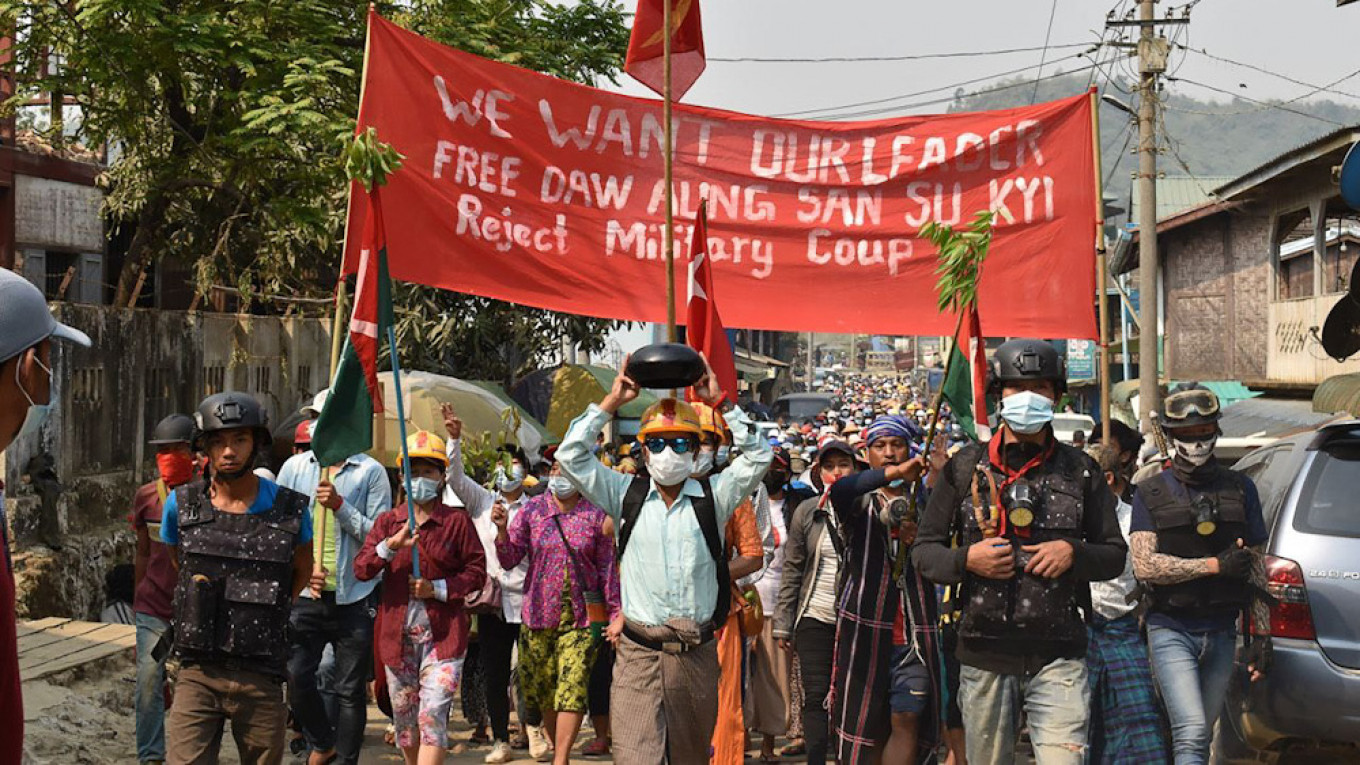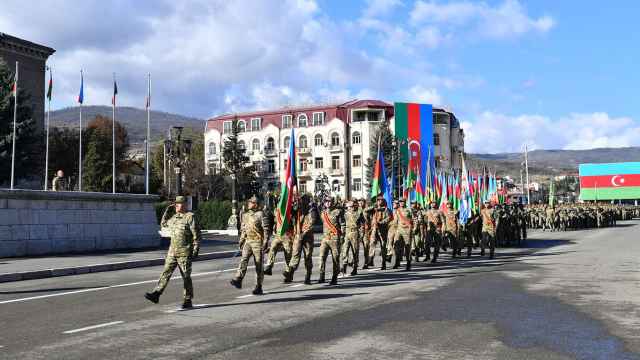It has long been assumed that Russian President Vladimir Putin dislikes “color revolutions”. The Kremlin was perhaps not so much moved by the Revolution of Roses in Georgia but the Orange Revolution in Ukraine had a significant impact on how Moscow started seeing Western capitals, which the Kremlin started to increasingly accuse of instigating protests in the “post-Soviet space”.
The idea of regime change became a nightmare for the Kremlin, and the Arab Spring — a series of anti-government uprisings and rebellions in the Arab world in the early 2010s — only strengthened Putin’s conviction that the West was behind the protests even in the Middle East and Africa.
The chilling images of bloodied Libyan dictator Muammar Gaddafi beaten up and eventually killed by a mob apparently convinced Putin that Dmitry Medvedev was unfit to be in charge of Russian foreign policy: Medvedev did not veto the UN Security Council resolution supporting military action against the Gaddafi regime.
And upon his return to presidency, Putin saved, in 2013, the murderous regime of Bashar al-Assad from the US military strikes in response to Assad’s use of chemical weapons against the anti-government forces by suggesting to Syria to dispose of its chemical weapons under international control.
Ukraine’s Revolution of Dignity, reviled by Putin as a “coup” executed by “nationalists, neo-Nazis, Russophobes and anti-Semites”, had an even stronger effect on the Russian president who decided to undertake an unprecedented venture and annex Ukraine’s Crimea and start a war in eastern Ukraine in 2014. The message of Putin’s war on Ukraine was that “color revolutions”, coups and regime changes lead to chaos, if only due to intervention of a third party. Because resistance, including armed resistance, to presumed “color revolutions” is always justified.
In Putin’s view, Ukrainian President Viktor Yanukovych had the mandate to use armed force against the Revolution of Dignity, but when the new, post-revolutionary Ukrainian government attempted to suppress Russia-backed separatists, Putin called it “a junta” that committed “a serious crime against the people”. Moreover, Putin praised alleged thousands of residents of Sevastopol who “rose up in unity to oppose the coup d’etat [of] the radical nationalist forces, which tried to intimidate everyone who resisted the abuses and unlawfulness of their aggressive actions”.
However unnatural Putin’s relation to the factual reality is, his attitude to “colour revolutions” and coups seemed consistent. Regime change should not be tolerated and must be thwarted by any means available; citizens who are not happy with the regime change have a right to offer armed resistance to it; a new regime that strives to neutralize counter-revolutionaries commits a crime against people.
The most recent developments cast doubt on the principled nature of Putin’s aversion to regime change, as the Kremlin has supported the military junta that overthrew the rule of Myanmar’s democratically elected State Counsellor Aung San Suu Kyi and deposed two dozen ministers and deputies.
The new regime installed by Min Aung Hlaing, Commander-in-Chief of the Armed Forces, is the very definition of a military junta, and, ironically, in its first crackdown on private and independent media, Min Aung Hlaing told them not to use the terms “regime” or “junta” for the State Administrative Council run by the military.
However, that did not prevent “anti-junta” Russia (together with “neutral” China) to veto a UN Security Council statement urging democracy in Myanmar to be expeditiously restored.
And even when the junta started an armed suppression of the predominantly peaceful and non-violent protests killing over 500 people including children by the end of March, the Kremlin continued to support the military regime. On the 27th of March, Russian Deputy Defence Minister Alexander Fomin attended the junta’s celebration of Armed Forces Day, and Fomin’s visit to Myanmar was the first high-profile visit to the country by a foreign official since the coup in February.
What does the Kremlin’s seemingly unscrupulous response to the violent overthrow of Myanmar’s democratically elected government by a military junta tell us about Putin’s own regime?
While the Myanmar coup d’état can be theoretically compared to “color revolutions” in the post-Soviet space and the Arab Spring protests, it is not the idea of a regime change as such that dismays Putin, but a very specific form of regime change — the one carried out by mass protests. In a broader perspective, it is the elitist aversion to politicized citizens that determines Putin’s contempt for people exercising their constitutional rights to protest against the authorities, either on streets or at a polling station.
But the Kremlin’s support for the Myanmar military junta is also a message to the West that condemned the violent overthrow of Aung San Suu Kyi’s rule. In this message, Moscow is demonstrating its dark power, projecting an image of a state inherently antagonistic to Western political values. It is a declaration of defiant opportunism and lack of normative boundaries that is aimed at confusing and intimidating the West.
A Message from The Moscow Times:
Dear readers,
We are facing unprecedented challenges. Russia's Prosecutor General's Office has designated The Moscow Times as an "undesirable" organization, criminalizing our work and putting our staff at risk of prosecution. This follows our earlier unjust labeling as a "foreign agent."
These actions are direct attempts to silence independent journalism in Russia. The authorities claim our work "discredits the decisions of the Russian leadership." We see things differently: we strive to provide accurate, unbiased reporting on Russia.
We, the journalists of The Moscow Times, refuse to be silenced. But to continue our work, we need your help.
Your support, no matter how small, makes a world of difference. If you can, please support us monthly starting from just $2. It's quick to set up, and every contribution makes a significant impact.
By supporting The Moscow Times, you're defending open, independent journalism in the face of repression. Thank you for standing with us.
Remind me later.








